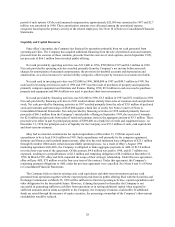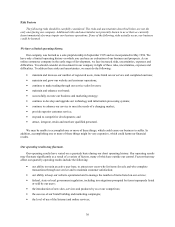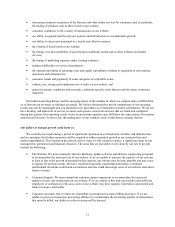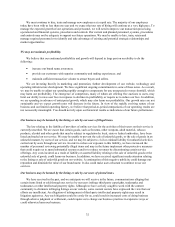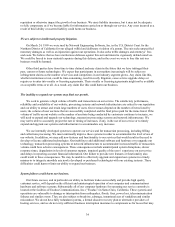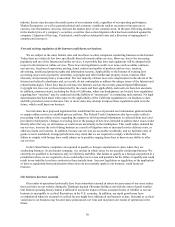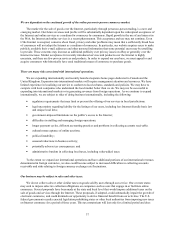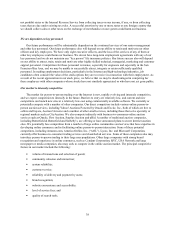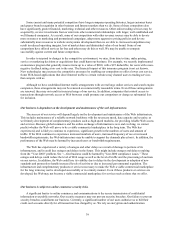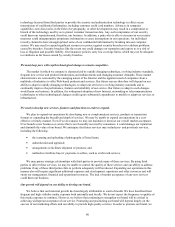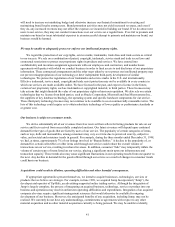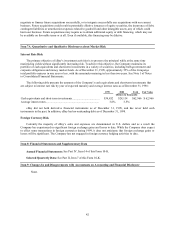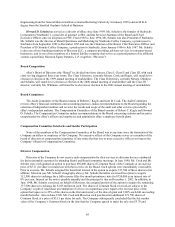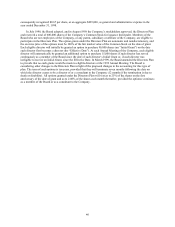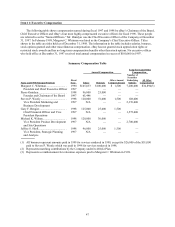eBay 1998 Annual Report Download - page 37
Download and view the complete annual report
Please find page 37 of the 1998 eBay annual report below. You can navigate through the pages in the report by either clicking on the pages listed below, or by using the keyword search tool below to find specific information within the annual report.37
We are dependent on the continued growth of the online person-to-person commerce market.
The market for the sale of goods over the Internet, particularly through person-to-person trading, is a new and
emerging market. Our future revenues and profits will be substantially dependent upon the widespread acceptance of
the Internet and online services as a medium for commerce by consumers. Rapid growth in the use of and interest in
the Web, the Internet and online services is a recent phenomenon. This acceptance and use may not continue. Even
if the Internet is accepted, concerns about fraud, privacy and other problems may mean that a sufficiently broad base
of consumers will not adopt the Internet as a medium of commerce. In particular, our website requires users to make
publicly available their e-mail addresses and other personal information that some potential users may be unwilling
to provide. These concerns may increase as additional publicity over privacy issues on eBay or generally over the
Internet increase. Market acceptance for recently introduced services and products over the Internet is highly
uncertain, and there are few proven services and products. In order to expand our user base, we must appeal to and
acquire consumers who historically have used traditional means of commerce to purchase goods.
There are many risks associated with international operations.
We are expanding internationally and recently launched separate home pages dedicated to Canada and the
United Kingdom. Expansion into international markets will require management attention and resources. We have
limited experience in localizing our service to conform to local cultures, standards and policies. We may have to
compete with local companies who understand the local market better than we do. We may not be successful in
expanding into international markets or in generating revenues from foreign operations. As we continue to expand
internationally, we are subject to risks of doing business internationally, including the following:
• regulatory requirements that may limit or prevent the offering of our services in local jurisdictions;
• legal uncertainty regarding liability for the listings of our users, including less Internet friendly basic law
and unique local laws;
• government-imposed limitations on the public’ s access to the Internet;
• difficulties in staffing and managing foreign operations;
• longer payment cycles, different accounting practices and problems in collecting accounts receivable;
• cultural nonacceptance of online auctions;
• political instability;
• seasonal reductions in business activity;
• potentially adverse tax consequences; and
• administrative burdens in collecting local taxes, including value-added taxes.
To the extent we expand our international operations and have additional portions of our international revenues
denominated in foreign currencies, we also could become subject to increased difficulties in collecting accounts
receivable and risks relating to foreign currency exchange rate fluctuations.
Our business may be subject to sales and other taxes.
We do not collect sales or other similar taxes on goods sold by users through our service. One or more states
may seek to impose sales tax collection obligations on companies such as ours that engage in or facilitate online
commerce. Several proposals have been made at the state and local level that would impose additional taxes on the
sale of goods and services through the Internet. These proposals, if adopted, could substantially impair the growth of
electronic commerce, and could diminish our opportunity to derive financial benefit from our activities. The U.S.
federal government recently enacted legislation prohibiting states or other local authorities from imposing new taxes
on Internet commerce for a period of three years. This tax moratorium will last only for a limited period and does



